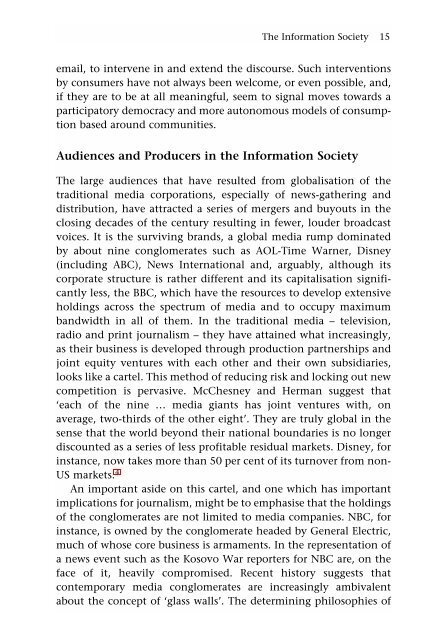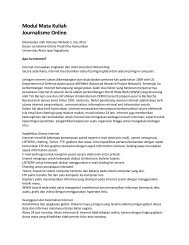Online Journalism - Ayo Menulis FISIP UAJY
Online Journalism - Ayo Menulis FISIP UAJY
Online Journalism - Ayo Menulis FISIP UAJY
Create successful ePaper yourself
Turn your PDF publications into a flip-book with our unique Google optimized e-Paper software.
The Information Society 15<br />
email, to intervene in and extend the discourse. Such interventions<br />
by consumers have not always been welcome, or even possible, and,<br />
if they are to be at all meaningful, seem to signal moves towards a<br />
participatory democracy and more autonomous models of consumption<br />
based around communities.<br />
Audiences and Producers in the Information Society<br />
The large audiences that have resulted from globalisation of the<br />
traditional media corporations, especially of news-gathering and<br />
distribution, have attracted a series of mergers and buyouts in the<br />
closing decades of the century resulting in fewer, louder broadcast<br />
voices. It is the surviving brands, a global media rump dominated<br />
by about nine conglomerates such as AOL-Time Warner, Disney<br />
(including ABC), News International and, arguably, although its<br />
corporate structure is rather different and its capitalisation significantly<br />
less, the BBC, which have the resources to develop extensive<br />
holdings across the spectrum of media and to occupy maximum<br />
bandwidth in all of them. In the traditional media – television,<br />
radio and print journalism – they have attained what increasingly,<br />
as their business is developed through production partnerships and<br />
joint equity ventures with each other and their own subsidiaries,<br />
looks like a cartel. This method of reducing risk and locking out new<br />
competition is pervasive. McChesney and Herman suggest that<br />
‘each of the nine … media giants has joint ventures with, on<br />
average, two-thirds of the other eight’. They are truly global in the<br />
sense that the world beyond their national boundaries is no longer<br />
discounted as a series of less profitable residual markets. Disney, for<br />
instance, now takes more than 50 per cent of its turnover from non-<br />
US markets. 4<br />
An important aside on this cartel, and one which has important<br />
implications for journalism, might be to emphasise that the holdings<br />
of the conglomerates are not limited to media companies. NBC, for<br />
instance, is owned by the conglomerate headed by General Electric,<br />
much of whose core business is armaments. In the representation of<br />
a news event such as the Kosovo War reporters for NBC are, on the<br />
face of it, heavily compromised. Recent history suggests that<br />
contemporary media conglomerates are increasingly ambivalent<br />
about the concept of ‘glass walls’. The determining philosophies of
















